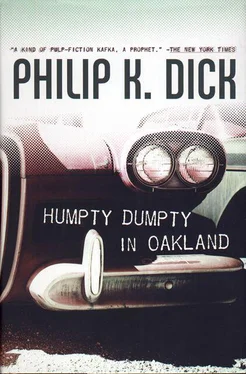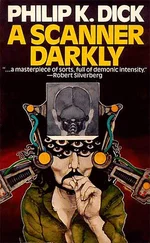The boy gave him change and retrieved the pouring-can. The hood slammed down and the old man drove from the station back onto the road. There a milk truck honked at him as he pulled in front of it.
As he drove, his eagerness increased. Now, at any time, he might see the sign leading to Marin Country Gardens. But he had left the freeway; the little road did not lead back to it but brought him out on a residential street. A huge wire cyclone fence separated him from “the freeway, and beyond the fence cars shot along at enormous speed. However, he continued on with no diminution of spirits, disconnected from the freeway as he was. Evidently he had entered San Rafael, a town to which he rarely, if ever, came.
Between silent houses he drove at twenty-five miles an hour. The blocks were short. A number of men could be seen on their way to work, walking rapidly, some wearing suits, others in work clothes. They all had a speeded-up motion, as in an old film. That amused him, too.
For a time he drove through the town, still keeping in sight of the freeway, wondering where he was but enjoying himself. And then at last he sighted something heartening. The broken-up expanse of new dirt which, he realized, was construction beyond the freeway. Great culverts lying in rows, the ceramic drainage system which would go down first, before anything else. And parked machinery. Big ones. The major equipment which the Federal Government used in its work; he had seen them when Highway 40 had been rebuilt, the Eastshore Freeway.
He came, then, to the very edge of the construction zone, and halted his car; he had no choice but to halt—the pavement ended in a series of jagged projections that had already cracked. The road on which he drove had been scooped away by the digging equipment. He saw down, into a drop-off. Dirt only. The underneath part which they usually never got to see. It frightened him, and he pulled on the handbrake. Machines, he thought, had carried away everything here; had left nothing at all. What power to remove! Nothing could stand . . . he looked to the right and left. Furrow for a long way, and so God damn wide. Did cars go across? Could one go and rejoin the freeway on the far side? He saw, high up, tiny swift dots. Cars on the freeway.
Parallel to the freeway ran a double track. Tread marks in the dirt, imprinted by pressure. Some vehicles. So he started up the car and drove down, off the asphalt; the car bumped, creaked, lifted on first one side and then the other. He drove carefully along the rutted tracks. The car shuddered as stones broke beneath the wheels. He gripped the steering wheel and eased the car into holes and out again.
Once he passed workmen who gaped at him. Then he passed mounds of machines. And, at last, he saw a metallic bulk approaching him head-on.
He stopped the car as the object became a bulldozer. The driver, perched high up in his seat, shook his fist and shouted; he, too, stopped, and the two vehicles faced each other. Fergesson did not get out. He remained behind the wheel.
The driver of the bulldozer jumped down and walked over. “Who the hell are you? Get this heap out of here.”
To Fergesson the bulldozer and the angry driver were unreal. He heard the man panting and saw his red face moon up at the window, but still he did not stir. He did not know what to do.
“Get back!” the man shouted. “Get back to the road! Come on, fellow!”
Fergesson said, “You know Mr. Bradford?”
Other workmen arrived and with them was a man in a business suit. They pointed at Fergesson’s Pontiac and waved more workmen to follow. A line of figures grew along the rise of equipment and dirt: onlookers.
The man in the business suit came to the window and said, “I’ll have to ask you to back your car the way you came. This is a private road for use by the State.”
Fergesson could think of nothing to say. He had come almost a mile along the rutted tracks in low gear. The idea of backing bewildered him. He felt confused and he could not speak.
“What’s the matter with him?” the driver was yelling. “Christ, I have to get by—I can’t fart around here.”
A workman said, “Maybe he doesn’t speak English.”
“Let me see your driver’s license,” the man in the business suit said.
“No,” Fergesson said.
A workman said, “He don’t know how to back out.”
“Move over,” the man in the business suit said. He opened the car door. “I’ll back it. Move over, buddy. Look, we can give you a citation; you’re on State property. You’re a trespasser. You have no legal right to be on this road; it isn’t a road, it’s a construction project.”
He pushed Fergesson over, slammed the door, and, putting the Pontiac into reverse and peering over his shoulder, began to back. The driver returned to his bulldozer and followed. It took a long time to reach the point at which the genuine road had ceased. Fergesson gazed at the floorboards and said nothing.
“Okay,” the man said, tugging on the parking brake and stepping out. “It’s all yours.”
“How do I go?” Fergesson said.
“Back, up the rise, the way you came.”
Fergesson pointed across the expanse of dirt, at the freeway on the far side.
“Go back,” the man repeated. “Back to San Rafael and find a street to cross there.” He walked rapidly off and Fergesson was alone. He could hear the rumble of the bulldozer and the sounds of the workmen; they were starting their day. Shifting into gear— the teeth clashed—he drove clumsily back along the road and once again found himself in the residential section of San Rafael, among the houses and lawns.
When he saw a man walking along the sidewalk, Fergesson leaned out the window and called, “How do I get across?”
The man glanced at him and went on without speaking. Fergesson rolled up the window again. He felt shaken and depressed and he did not pursue the man. The time was now nine o’clock and the sky was warming. Yellow sunlight hung over the trees and sidewalks; the lawns sparkled. A mailman walked slowly along and Fergesson brought the car to the curb beside him.
“How do I get across 101?” he said.
“Where do you want to go?”
“Marin Country Gardens,” he said, resting a little as he sat behind the steering wheel.
The mailman consulted with himself. “No,” he said, “I never heard of it. Go down to the city hall and ask them. Ask somebody down there; they’ll know.” He continued on.
From then on the old man drove aimlessly, not knowing where to go or whom to talk to. He seemed to be getting farther and farther away from the main part of town; the streets became steeper and the houses older. At last he came out into what seemed to be a housing tract, but an old one; the houses were decayed and the weeds high in the yards.
Once he saw a policeman, but the policeman looked tough and unsympathetic so he did not stop there either. The time was now a quarter past ten. This is a hell of a thing, he thought to himself. Where am I? Still in San Rafael? He saw, past the tract, what appeared to be a glimpse of open country. Fields, hills far off.
At ten-thirty he came to an intersection at which was a small imitation-stone building with a sign over it: DOWLAND REAL ESTATE NOTARY PUBLIC RENTALS. So he parked the car and went inside.
Behind one of the three desks sat a middle-aged woman in a print dress, wearing a hat and talking on the phone. She smiled at him, concluded her conversation, and then came over to the counter. “Good morning,” she said.
Fergesson said, “I want to go to Marin Country Gardens.”
The woman pondered. She seemed well groomed with gray hair pulled back and waved; her clothes looked expensive and she smelled of powder and perfume. “That’s not ours,” she said. “That’s one of the new subdevelopments on the far side of 101.” Hesitating, she said, “I frankly don’t even know if they’re showing, yet.”
Читать дальше










